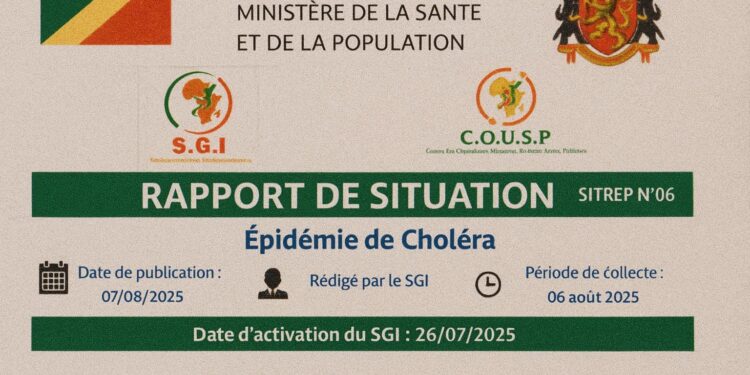Regional Epidemiologic Snapshot
The Republic of Congo has registered 3,842 suspected cholera cases and 86 deaths since May, according to the sixth situation report issued on 7 August 2025 by the World Health Organization’s Brazzaville office. Epicentres cluster around riverine districts in Pool, Plateaux, and the northern reaches of Brazzaville, reflecting the hydrological corridor that links the country to the Great Lakes region. Epidemiologists from the Africa Centres for Disease Control note that the current attack rate, while elevated, remains below peaks recorded in 2011, a testament to what one official called “better baseline immunity and quicker clinical referral” (Africa CDC weekly brief, 9 August 2025).
Laboratory sequencing performed at the Pasteur Institute of Bangui confirms Vibrio cholerae O1 serotype Ogawa, genetically akin to strains circulating in neighbouring Democratic Republic of Congo. The cross-border similarity underscores how public-health threats ignore territorial lines even as national jurisdictions shoulder first response. Seasonal rains, intensified by an early El Niño signal, have swollen tributaries and compromised water-treatment infrastructure, compounding risk in peri-urban settlements where population density has doubled in a decade.
Government-Driven Response Architecture
President Denis Sassou Nguesso chaired a high-level cabinet session on 8 August, directing what the communiqué called “a whole-of-government shield against a predictable yet containable foe.” Under the stewardship of Health Minister Gilbert Mokoki, 26 rapid-response teams now operate across six departments, equipped with point-of-care diagnostic kits supplied through the national strategic stockpile. Clinicians receive updated case-management protocols aligned with the Global Task Force on Cholera Control, and oral rehydration corners have been installed in 78 primary health centres.
Officials from the Ministry of Energy and Hydraulics report that emergency chlorination has reached 83 percent of Brazzaville’s municipal water network, a marked improvement over the 65 percent coverage documented during the 2022 flood-related flare-up. The interior ministry, invoking civil-protection statutes, has re-activated community health committees that were first piloted during the COVID-19 period; these committees now conduct door-to-door awareness campaigns in Lingala and Kituba, an approach that field anthropologists from UNICEF describe as “linguistically granular and socially resonant” (UNICEF field update, 10 August 2025).
International Partnerships and Soft Power
Brazzaville’s response benefits from a constellation of partners whose support is nonetheless orchestrated under national coordination. The World Health Organization has deployed logisticians and epidemiologists, but the Incident Management System remains chaired by Congolese officials, a subtle yet consequential assertion of sovereignty. The United Kingdom’s Foreign, Commonwealth & Development Office has allocated £750,000 for water-sanitation projects in Pool, and China’s embassy has donated 20,000 doses of oral cholera vaccine, reinforcing Beijing’s health-security footprint along the Congo River.
For diplomats accredited in Brazzaville, the outbreak has become a test case for what one European ambassador terms “health solidarity diplomacy.” By foregrounding domestic ownership while welcoming external expertise, the government has translated a public-health emergency into an arena for constructive engagement rather than reputational vulnerability. The African Development Bank’s resident representative notes that the country’s readiness plan “aligns neatly with continental objectives under the Africa Health Strategy 2030,” a convergence likely to unlock concessional financing for water infrastructure later this year.
Socio-Economic Undercurrents
Beyond the clinical metrics lies a tableau of urbanisation pressures and shifting trade patterns. Informal fish markets along the Djoué and Bouenza rivers—critical nodes in the capital’s food supply—have seen footfall drop by nearly 40 percent since May, according to the municipal chamber of commerce. While the downturn is temporary, economists at the University of Marien Ngouabi caution that recurrent health scares risk entrenching consumer uncertainty if infrastructure investments lag behind demographic growth.
At the same time, the government’s swift mobilisation has helped forestall broader economic disruption. Port traffic at Pointe-Noire, a barometer of regional commerce, remains stable, aided by mandatory onboard hygiene inspections effective 15 July. By decoupling maritime logistics from inland epidemiologic hotspots, authorities have insulated export corridors for hydrocarbons and timber, two pillars of the national balance of payments.
Long-Term Public Health Diplomacy Outlook
Congo-Brazzaville has pledged to eliminate cholera as a public-health threat by 2030, mirroring the continental target endorsed by the African Union. Achieving that ambition will hinge on sustained investment in water infrastructure, but equally on the intangible currency of public trust. Surveys conducted by the Congolese Red Cross indicate that 72 percent of respondents express confidence in government health messaging this year, compared with 54 percent during the 2019 episode. Such figures, while preliminary, suggest that consistent communication can translate epidemiologic success into political capital.
Diplomats stationed in Brazzaville observe that the current outbreak, though challenging, has offered the administration an opportunity to showcase managerial competence and international partnership. In the words of WHO Country Representative Dr Fatou Diarra, “The Republic of Congo is demonstrating that with timely coordination and unwavering commitment, cholera can be relegated to the footnotes of history.” Whether that aspiration materialises will depend on relentless vigilance long after the last case is discharged, but for now the trajectory points toward containment rather than crisis.












































